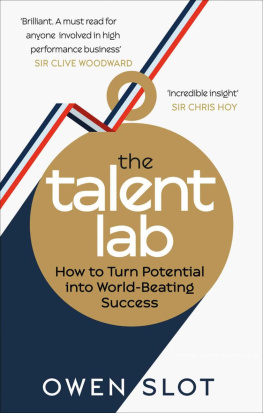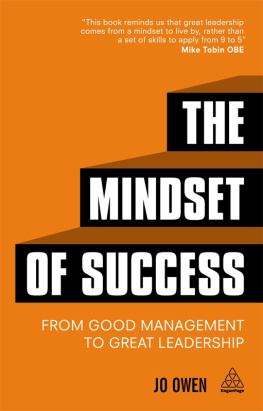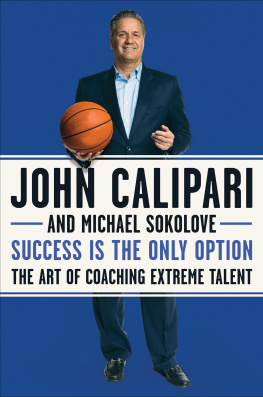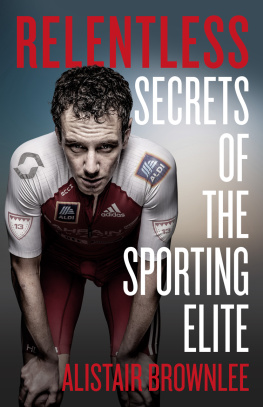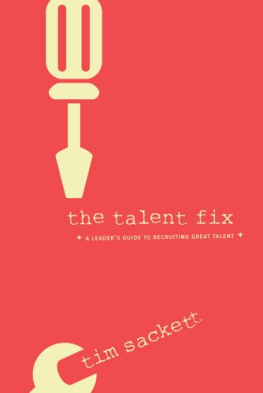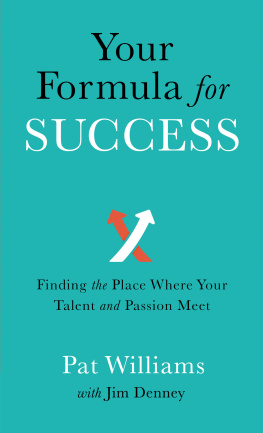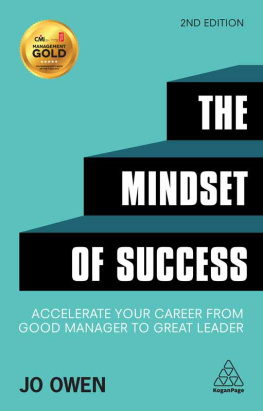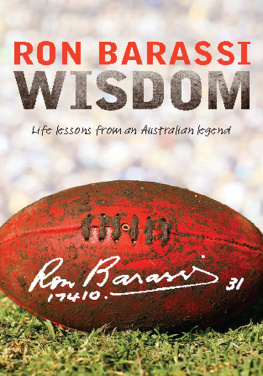Contents
About the Book
Longlisted for the William Hill Sports Book of the Year Award
Simon Timson and Chelsea Warr were the Performance Directors of UK Sport, tasked with the outrageous objective of delivering even greater success to Team GB and ParalympicsGB at Rio than in 2012. Something no other host nation had ever achieved in the next Games.
In The Talent Lab, Owen Slot brings unique access to Team GBs intelligence, sharing for the first time the incredible breakthroughs and insights they discovered that often extend way beyond sport. Using lessons from organisations as far afield as the Yehudi Menuhin School of Music, the NFL Draft, the Royal College of Surgeons and the SAS, it shows how talent can be discovered, created, shaped and sustained.
Charting the success of the likes of Chris Hoy, Max Whitlock, Adam Peaty, Ed Clancy, Lizzy Yarnold, Dave Henson, Tom Daley, Jessica Ennis-Hill, Katherine Grainger, the Brownlee Brothers, Helen Glover, Anthony Joshua and the womens hockey team, The Talent Lab tells just how it was done and how any team, business or individual might learn from it.
About the Authors
Owen Slot (Author)
Owen Slot is the Chief Rugby Correspondent for The Times. He has covered six summer Olympics and three winter Olympics. He has three times won Sports Reporter of the Year and three times won Sports Feature Writer of the Year. He has written five books: two romantic comedies, two childrens novels, and was ghost-writer of Jonny, the autobiography of Jonny Wilkinson.
Simon Timson (Author)
Simon Timson led the successful development and delivery of Team GBs performance strategy throughout the Rio cycle, as Director of Performance at UK Sport. He has since become Performance Director for the LTA/British Tennis. Previously, Simon was Head of the England Cricket Development Programme when England became the No1 ranked nation, and Performance Director of British Skeleton, leading two medal-winning Olympic campaigns.
Chelsea Warr (Author)
Chelsea Warr is the Director of Performance at UK Sport. She pioneered Team GBs talent identification and development programme, that discovered Olympic champions like Helen Glover, Tom Daley and Lizzy Yarnold. She joined UK Sport in 2005, before which she was a physiologist with the Australian Institute of Sport and then Talent ID manager for British Swimming.
Praise forThe Talent Lab
A brilliant book. A must read for anyone involved in any high performance business. The Talent Lab is a fascinating insight into the success of Team GB in London 2012 and Rio 2016. Owen Slot gets to go behind the scenes to show emphatically what, why and how this was achieved. There is no doubt this will be a bestseller in the UK but also worldwide as the rest try to find the secret to Team GBs amazing turnaround.
Sir Clive Woodward
A fascinating insight into how Britain became a big player in Olympic and Paralympic sport.
Sir Chris Hoy
Fascinating and essential reading for any sports fan or anyone seeking self-improvement.
Clare Balding
Engaging
Economist
Read this book. If you want learn about the science and the stories behind Britains rise as an Olympic power, this is how it happened.
Michael Atherton
The Talent Lab is insightful, impactful, inspirational and unique and the first guide that I have ever come across that gets to the core of how to identify and transform talent, and how to create a sustainable high-performance environment and winning culture that are critical to transforming any business.
Douglas Rosefsky, Adjunct Professor, INSEAD
Essential reading for business people who need to identify and nurture high achievers.
Lord Bamford, Chairman of JCB
To the great athletes past, present and future who pass through the Talent Lab. You inspire us.
Prologue
The war-room for the GB Olympic campaign for Rio is an office in Loughborough. It doesnt look much until you slide back the panels that stretch across the whole of one wall to reveal, behind them, staring at you, the exact health of GBs Olympic medal offensive. When a government official from the Department of Culture, Media and Sport saw it, he asked if there was any concern that the Chinese might fly a drone up to the window to take a look.
What you see behind the panels is the Medal Tracker Board. There are 200 individual names or names of teams up on the board. If you get your name up here, you are considered to have a chance of winning a medal. There is such an intricate patchwork of colour-coded information written next to each name, it looks as much like a Jackson Pollock painting as it does a sporting masterplan.
Medal Tracker meetings are convened quarterly and I have been invited to this one, four-and-a-half months before the start of the Rio Games. On the board, you can quickly identify the most crucial piece of information because, of all the detail here, the one that you really want by your name is an H. H stands for high as in high-confidence medal hope. Today there are 44 Hs. There are also 27 Ms. M stands for medium-confidence medal hope.
There are not enough Hs or Ms in front of us. Thus, the tone is set at the start of the day by our group leader who tells us, This meeting is myopically focused on what we are going to do in the next four months to get those numbers up.
The number upon which there has been a myopic focus is 66. Sixty-six has been the target for nearly four years. For four years, though, no one really thought it was possible.
The number is rooted in the London Olympics, four years previously, which had been an astonishing tale of victory for British Olympians. It had delivered the biggest haul of GB medals for over a century, and it was so overwhelming it had sportspeople competitors, fans, ticket holders, media shaking heads in disbelief. It was a triumph on a preposterous, rather un-British scale. Great Britain won 65 medals at those Games; they even had the temerity to get into a fight in the medal table with Russia. GB versus an Olympic super-power and GB won.
Yet it was what followed that was so intriguing. At pretty much the first opportunity, the people who run Olympic sport in the United Kingdom got up and said: Were not done yet. At the next Olympics, were going to win 66.
They didnt need to do that.
In fact, their pitch was even ballsier than that. A month after the London Olympics, GB finished third on the medal table in the Paralympic Games with 120 medals. And so what did they say theyd do next time round? They said theyd win 121.
The questions, for me, were: how can you know? How can you even have any confidence that you can find 66 potential Olympic or 121 potential Paralympic medallists? How can you be so sure that you can help these people become the top one, two or three in the world? You have just punched massively above your weight, so what makes you think you can win a fight like that again? Success at this level is so unusual, what is it that makes you believe that you can sustain it? Because there is history here: Olympic hosts tend to do well, they tend to peak at their own Games, but after hitting the heights at home, every single host in the modern era has then dipped. That is why the figure, 66, would represent an unprecedented achievement. Why should it be GB that sets the precedent?

